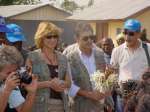Number of refugees and migrants arriving in Greece soars 750 per cent over 2014
News Stories, 7 August 2015
GENEVA, Aug 7 (UNHCR) – Some 124,000 refugees and migrants had arrived in Greece by sea at the end of July this year – a staggering 750 per cent increase on the same period in 2014, the UN refugee agency detailed on Friday.
UNHCR said that in July alone 50,000 new arrivals were reported, 20,000 more than the previous month -- an increase of almost 70 per cent -- mainly to the islands of Lesvos, Chios, Kos, Samos and Leros.
"This humanitarian emergency is happening in Europe, and requires an urgent Greek and European response," Vincent Cochetel, UNHCR's Director of the Bureau for Europe, said in a statement following a visit to Greece last week with the Director of Emergency, Security and Supply to assess the refugee crisis in the country.
Cochetel said the "vast majority" of those coming to Greece are from countries experiencing conflict or human rights violations, mainly Syria, Afghanistan, and Iraq.
While Syrians make up 63 per cent of all arrivals since the beginning of the year, the percentage of Syrian arrivals increased in July to 70 per cent.
Many are in need of urgent medical assistance, water, food, shelter and information. All are exhausted. The reception infrastructure, services and registration procedures are falling far short of real needs.
"Such a level of suffering should and can be avoided. The Greek authorities need to urgently designate a single body to coordinate response and set up an adequate humanitarian assistance mechanism," Cochetel added.
UNHCR is contributing to the efforts to address this urgent situation. This includes interpretation services, providing legal information, and basic emergency assistance.
As a contribution and to complement the action of many volunteers and national and international NGOs, UNHCR is delivering basic humanitarian assistance, like water bottles, energy bars, sleeping bags and hygiene kits.
The generous response of Greek civil society, in a difficult context, should be recognized and supported.
UNHCR is also providing, with the assistance of the Greek NGO METAction, escorts for the transfer of unaccompanied children from the islands to specialized facilities on the mainland. In Lesvos, the island with the largest number of arrivals, UNHCR is providing three buses to transport refugees from their arrival points to the registration point in Mytilene, so they no longer face a walk of 70km through the mountains in searing temperatures.
However, the support UNHCR is providing is targeted and time-limited as worldwide the agency is confronted with many crises and its programmes are woefully underfunded.
The challenges do not end with the transfer of refugees from the islands to Athens and more efforts are needed to ease access to the asylum procedure; only 6,200 have applied for asylum as of end of June.
There is also an urgent need to increase reception capacity on the mainland for asylum-seekers and unaccompanied children (currently 1,100 places). In Athens, around 400-450 people – mainly families with young children – have been sleeping rough in the central park of Pedion Tou Areos. The government is in the process of setting up a new reception centre with better facilities to meet the growing humanitarian needs and UNHCR is assisting with technical support.
"Greece and Europe need to lead the response to this crisis, which can be resolved only through more solidarity within and outside the EU and increased alternative means to reach Europe for refugees fleeing from violence," added Cochetel.
So far in 2015, over 225,000 refugees and migrants have arrived by sea in the Mediterranean and around 2,100 are estimated to have died or gone missing while trying to reach Europe – not including the incident that took place on August 5.
By William Spindler, Geneva






















































